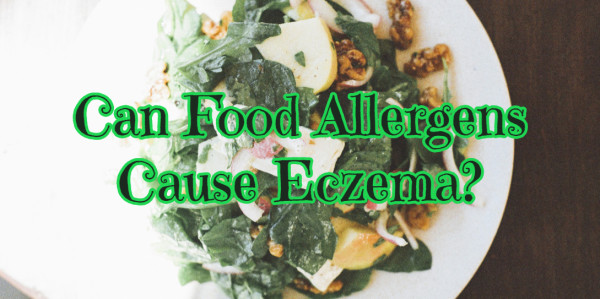While food allergens do not cause a person to develop eczema, they can trigger it to flare up if you are already a sufferer of this itchy, condition. Because atopic dermatitis can react to food allergies both by being consumed or by topical exposure, it is imperative that you determine which foods you are having reactions to. Sometimes however, this can be easier said than done. Let’s take a further look at this topic below.

Detection
According to AllergyUK, there are two main ways to determine whether or not a food allergy worsens your eczema symptoms or triggers it to flare up:
- Immediate Reaction:
An immediate reaction will typically produce itching and redness to the skin within two hours of being exposed to the food allergen. These reactions are believed to be the food reacting with the IgE antibody. This allows for the IgE antibody blood test and skin prick test to be helpful in determining allergies, more so with children.
- Delayed Reaction:
A delayed reaction can come about 24-48 hours after consuming a food that induces an allergic reaction. Redness can be more prevalent and itching can be more excessive and irritating. These reactions are commonly attributed to your bodies immune cell responses rather than the IgE antibody, making testing not reliable for identifying the triggers.
It is uncommon for most people to be allergic to more than one or two foods. There is no need to completely eliminate foods until you have discussed with your physician what you believe your eczema triggers are or have had the proper testing done already with conclusive results.
Food Allergies
There is an abundant selection of food in our world. This can overwhelm a person looking to identify which foods trigger their eczema to flare up. According to Dr. Daniel Searing, a pediatrician at the National Jewish Health Center in Denver, Co, there are seven common foods that are linked to eczema related allergies including:
- Wheat/Gluten
- Eggs
- Milk
- Fish
- Peanuts
- Tree Nuts
- Soy
It is possible to develop allergies over time, although childhood is a significant time for recognizing allergens, especially those with more severity.
Reactions
The level of reaction you experience to the culprit varies from mild to in some cases, life threatening, even fatal. Peanuts are probably the most common allergy that has produced fatalities and severe allergic reactions.
Not all reactions are in this same ball park of severity, however. In addition, your reactions may worsen each time you consume a food that is the culprit. For example, you may experience mild reactions to fish; however, which each time you introduce it to your bodies system, the reactions may worsen.
Common food allergen reactions include:
- Vomiting/Diarrhea
- Cramping/Stomach Pain
- Decline in BP (Blood Pressure)
- Hives (can be localized to an areas such as the face or be experienced all over)
- Difficulty breathing
- Swelling of the mouth including: lips, tongue and throat
If you believe you are experiencing allergen responses to foods that are causing your eczema to worsen, speak with your physician immediately and eliminate that food from your diet. It may be beneficial for you to keep a daily documentation (journal) of the foods you have eaten. This could help you in identifying what triggers your eczema.
Dr. Cheryl Lee Eberting is a board certified dermatologist who has dedicated her career to research and treatment of skin ailments. She blogs regularly at cherylleemd.com
